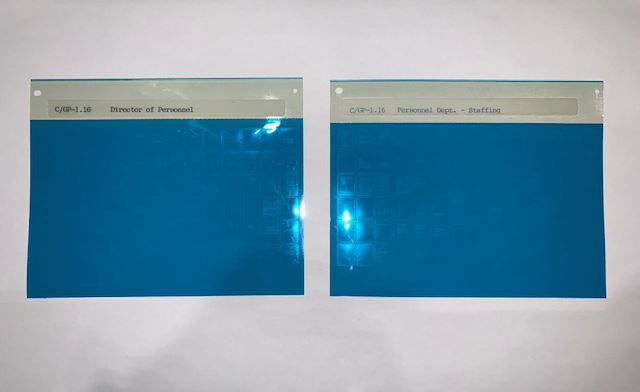Preservation is a challenging issue for archives, especially when the records are in proprietary formats that require specific outdated technology. In the following blog post, the City of Winnipeg Archives faced these challenges with the records of the Board of Commissioners.
The City of Winnipeg Archives has recently digitized the proprietary microfiche records of the Board of Commissioners.
From 1972 to 1997, the Winnipeg Board of Commissioners provided leadership to civic departments and advice on key issues facing the City. Despite this important role, it was discovered in 2004 that the Board did not maintain its physical records, but rather, made microfiche copies of its paper files, destroying the originals. A proprietary type of Microx fiche was used, making the roughly 850,000 images on 24,000 fiche the only copies available for reference. Not only is this type of fiche sensitive to handling and the environment, but its proprietary nature means that it requires specialized, expensive, and difficult to acquire technology to access, and cannot be viewed using most microform readers.
In 2012, the fiche was transferred to the Archives, which sought to have it digitized to make it accessible. However, the cost was prohibitive – estimated at over $70,000 – and there were few vendors capable of dealing with this uncommon type of fiche. As such, digitization was not pursued at that time. But the Archives did not give up. After consulting with imaging specialists, the Archives applied for an innovation grant to pursue the project, which it obtained in 2019.
Data Repro Com Ltd. was awarded the contract and the fiche was shipped to them with encrypted hard drives, where they were digitized and indexed according to a file key. Despite having the proper technology, the volatile and proprietary nature of the fiche made them difficult to scan. The vast majority of scans turned out well, but some scans are difficult to read and several cannot be read at all. This exemplifies the pitfalls of destroying original records for the sake of convenience. Whether it’s microfiche or digitized records, destroying originals often costs more money and causes more problems in the long run. This also speaks to problems with using proprietary formats that are dependent on rare technology and are not widely used. This is especially applicable to digital records, the formats of which can become obsolete very quickly and may be dependent on technology owned by a private company to access.
The digitized fiche will be ingested into the Archives’ open-source digital preservation system, Archivematica. The preservation system ensures the Archives’ digital records will be safe and accessible long into the future by constantly monitoring for data corruption, regularly migrating files into new, open, and widely used formats to keep pace with changing technology, and logging every preservation action taken in a machine-readable manner.
This story is featured in the City of Winnipeg Records Committee’s 2020 annual report: https://winnipeg.ca/clerks/pdfs/2020RecordsReport.pdf

Image tag: Two of approximately 24,000 proprietary Microx fiche.